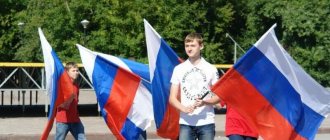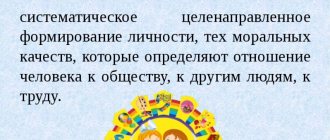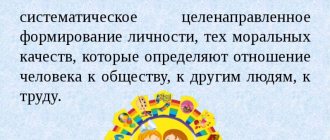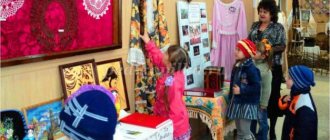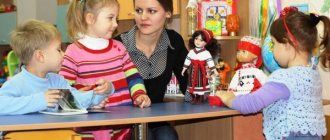Patriotic education as a spiritual and moral guideline for preschool children
Bibliographic description:
Ilyukhina, T. G. Patriotic education as a spiritual and moral guideline for preschool children / T. G. Ilyukhina. — Text: immediate // Education: past, present and future: materials of the V International. scientific conf. (Krasnodar, November 2022). — Krasnodar: Novation, 2022. — pp. 24-26. — URL: https://moluch.ru/conf/ped/archive/309/14557/ (access date: 01/18/2022).
Speaking about modern society, many speak about the crisis that has affected many of its aspects: economic, political, social and spiritual.
We live in an era of global change. On the one hand, changes are new opportunities, innovative ways to solve problems, ways to make our lives better, more interesting and varied. On the other hand, along with this, the main, basic values are imperceptibly lost and changed. So, for example, we can say that in modern society historical continuity with the past is lost, family traditions are not passed on to the younger generation, hedonism becomes the norm of life, and the sense of patriotism is lost as one of the spiritual and moral values of our people.
At the present stage, there is an alienation of the younger generation from the socio-historical experience of their people, national culture and history.
At the same time, there is an acute “moral deficit” in society. One of the characteristic manifestations of spiritual and moral emptiness in society is the loss of patriotism. We can assume that this is a consequence of political events in the nineties, as well as reforms in the education system and the teaching community.
The relevance of the revival of patriotism in society is beyond doubt. To date, the Government of the Russian Federation has adopted Resolution No. 1493 of December 30, 2015 on the state program “Patriotic education of citizens of the Russian Federation for 2016–2020,” which preserves the continuity of processes for the formation of patriotic consciousness as one of the factors of the unity of our nation.
Problems of patriotic education have caused great activity among scientists at different times. A great contribution to their solution was made by: L. N. Tolstoy, Ya. A. Komensky, A. S. Makarenko, V. A. Sukhomlinsky, K. D. Ushinsky, E. Yu. Alexandrova, E. P. Kostina, S. N. Nikolaeva and others.
Even N.A. Berdyaev wrote: “A person enters humanity through national individuality, as a national person.”
All the works and works of scientists, one way or another, agree on the importance of starting patriotic education in preschool age, because this age period is the most important period in the formation and formation of the human personality. At this age, higher social feelings, which include the feeling of patriotism, have the opportunity for formation and development. In the work of a preschool teacher, we solve aspects of patriotic education in various types of children's activities. In games, in open classes on patriotic education, quiz competitions, on a walk, in the affairs of everyday life, relationships with peers and with adults are formed. Of particular interest and activity among preschool children are classes from the cycle of patriotic education “Diverse Planet”, “Heroes of the Russian Land” and participation in a folk costume competition. Thus, children acquire patriotic qualities: the ability to be friends with people of different nationalities, selflessness, active citizenship, respect and love for their homeland, nation.
Patriotic education of preschool children is one of the main tasks of preschool education. In the “Concept for the Modernization of Russian Education,” the most important tasks in the education system were civic, patriotic, and moral education, taking into account universal human values and the Russian version of their implementation.
One of the guidelines at the stage of completion of preschool education, set aside in the Federal State Educational Standard of Preschool Education, is the formation of the need to actively interact with an environment that is understandable and close to the child, the manifestation of curiosity and empathy.
Understanding one’s national and ethnic identity, culture and values of one’s homeland begins with one’s immediate environment, and then extends to the universal. “Love for the homeland begins with the family,” said F. Bacon. It is very important for a little person to have significant people next to him: parents, sisters, brothers, grandmothers, grandfathers. These are the roots that connect him with his home and close surroundings. Mom and dad, home street, home - it is in the family that the seed from which the feeling of love for one’s Motherland grows begins. What parents give to a child is laid in his spiritual foundation and moral guidelines.
Understanding the importance of the family’s influence on the formation of a child’s patriotic feelings, in our educational organization we pay special attention to interaction with the families of students. We believe that in modern conditions there is a need for close contact with the family, for personality-oriented interaction between the family and preschool teachers.
Thus, we need to consider the introduction of new forms of interaction with parents to orient families towards the formation of patriotic education of children, paying attention to the fact that it is in preschool age that the basic guidelines for patriotic ideas are laid.
In our work with parents, we practice activities aimed at spending joint leisure time, organizing themed holidays, and open classes. Such interaction contributes to maintaining a constructive dialogue with the family, the opportunity to jointly perform tasks that are important both for the family and for society as a whole. For example, during the interaction we discovered the following:
- Parents do not pay enough attention to the problem of patriotic education. Most parents do not have basic knowledge of the history and sights of the city.
- Those parents who understand the relevance of patriotic education do not know how best to do this. They do not always know how to select the necessary types and forms of joint activities, taking into account the individual age characteristics of each child.
So, given the fact that patriotic education in preschool children is an integral part of the formation of spiritual and moral guidelines, special attention is paid to this in the modern educational system.
We see that in order to achieve the goal in matters of patriotic education in the education system, the following is necessary:
- Search and development of innovative methods, approaches, forms of patriotic education that will contribute to new approaches in organizing activities. This can be in the form of a virtual excursion, a thematic quest, and more.
- The readiness of preschool teachers themselves for patriotic education of children. Understanding the need to acquire theoretical knowledge, practical skills, knowledge of the peculiarities of work on the formation of patriotic feelings, familiarization with the native land and its attractions, logically consistent work in the direction of patriotic education.
- All activities aimed at developing patriotic feelings in preschool children must be continuous and consistent. Purposeful and systematic pedagogical influence, strict selection of the volume of available knowledge for children, taking into account individual age and personal characteristics - this is what you need to focus on in your work on patriotic education.
The statement of K. D. Ushinsky: “Just as there is no man without self-love, so there is no man without love for the fatherland, and this love gives education the sure key to a person’s heart...” has not lost its relevance in the modern world.
Literature:
- Ilyukhina T. G. Formation of spiritual and moral guidelines in preschool children at the present stage. //Young scientist. International scientific journal. 2022, No. 38 - pp. 105–107.
- Aleshina A.V. Patriotic education of a preschooler. M.: TsGL, 2005, - p. 256.
Key terms
(automatically generated)
: patriotic education, preschool age, preschool department, patriotic education of children, education system, formation, close environment, preschool education, special attention, modern society.
Spiritual and patriotic education of preschoolers article on the topic
Let the child feel the beauty and admire it,
let the images remain forever in your heart and memory,
in which the Motherland is embodied.
V.A. Sukhomlinsky.
The relevance of patriotic education at the beginning of the 21st century for the country as a whole is due to significant fundamental changes that have occurred in recent decades in all spheres of society.
Patriotic education is a complex and high human feeling. Its content is so multifaceted that it is indefinable in a few words. This is love for family and friends, for native places and pride in one’s people, and a feeling of one’s inseparability with the outside world, and the desire to preserve and increase the wealth of one’s country.
Patriotic education is a capacious concept. It should begin with birth, love for mother, family and friends. The feeling of the Motherland begins with the ability to see the beauty of one’s native nature. Close attention of educators and parents should be directed to the content of children's activities. By directing any type of activity, we, adults, can influence the child’s sensory sphere, his moral manifestations, judgments, relationships with peers, expand and clarify knowledge, form in him an initial sense of the Motherland - the correct attitude towards society, people, work, and his responsibilities. Each type of activity creates favorable opportunities for the implementation of certain educational tasks: in the classroom to solve problems related to the mental development of the child, in the game - collectivism skills, in the process of work - respect for working people, hard work and frugality, organization and a sense of responsibility and duty.
Based on this, a whole range of tasks can be defined:
- nurturing in a child love and affection for his family, home, kindergarten, street, city;
- formation of a caring attitude towards nature and all living things;
- instilling respect for work;
- developing interest in Russian traditions and crafts;
- formation of basic knowledge about human rights;
- expanding ideas about Russian cities;
- introducing children to the symbols of the state (coat of arms, anthem, flag);
- developing a sense of responsibility and pride for the country’s achievements;
- the formation of tolerance, a sense of respect for other peoples and their traditions.
These tasks are solved in all types of activities: in classes, in games, in work, in everyday life - as they instill in the child not only patriotic feelings, but also form his relationships with adults and peers. The feeling of the Motherland begins with admiration for what the child sees in front of him, what he is amazed at and what evokes a response in his soul... And although many impressions are not yet deeply realized by him, but, passed through the child’s perception, they play a huge role in the formation of the personality of a patriot.
Childhood is the time of development of all human powers, both mental and physical, the time of acquiring knowledge about the world around us, the time of formation of moral skills and habits. patriotic feelings.
Turning to spiritual life also begins in preschool age with moral self-determination and the formation of self-awareness.
Spirituality, according to teacher G.P. Shevchenko. This is an integrated personality trait, an indicator of the level of human relations, a moral and aesthetic position, the ability to empathize, compassion, mercy, charity. This is the highest manifestation of good manners, a purely moral activity.
Spirituality is morality.
Spirituality is what elevates the personality above physiological needs, ethical calculation, rational reflection, what relates to the highest ability of the human soul, what is embedded in the foundation of his personality.
Spirituality is the highest, final, highest thing that a person strives for. This highest may be low, but spirituality is always the subject of human aspirations, the direction of his soul, aspiration towards chosen goals.
Cultivating a sense of spirituality in preschoolers is a complex, lengthy process that requires teachers to have great personal conviction and inspiration. This work should be carried out systematically, systematically in all age groups, in different types of activities and in different areas on a play basis. The spiritual environment in which a child grows and is brought up has an even greater impact on his personality. Our kindergarten pays great attention to the spiritual sphere in which a child grows and is educated.
During the period of preschool childhood, those character traits are laid and developed that connect the child with his people, their language, songs, music, impressions received by a little person from the nature of his native land, details of life, morals and customs of the people among whom he lives. Through the centuries, the Russian people have carried their cultural heritage, the most valuable in folklore, Christian holidays and rituals, fairy tales, epics, songs, folk crafts and decorative arts. Any nation extends itself through children. Folk art is an inexhaustible source of pedagogical material, one of the foundations of directed aesthetic and patriotic education. Folk wisdom, embodied in fairy tales, nursery rhymes, jokes, riddles, sayings for many centuries, has instilled in children pride in their talented people, love for their native language, and interest in well-aimed expressive words.
Children learn a lot of interesting things about the past from old people, many useful things in life, they learn their first work skills from their grandparents, and the latter help children learn the secrets of nature. Grandmothers introduce children to the origins of folk poetry and teach them their native language. And most importantly, they, these people who have lived a long, difficult life, teach children to be kind, sympathetic, and attentive to other people.
The attempts made to date to educate a spiritual and moral personality show that the weakest point in this activity is the family. Therefore, it is necessary to help parents realize that, first of all, moral and spiritual customs and values created by their ancestors must be preserved and passed on in the family, and that it is parents who are responsible for raising children. To become kind to people, you need to learn to understand others, show empathy, honestly admit your mistakes, be hardworking, be amazed at the beauty of the surrounding nature, and treat it with care. A preschooler must first recognize himself as a member of the family, an integral part of his small homeland, then a citizen of Russia, and only then – an inhabitant of the planet.
Inheriting moral and aesthetic values in preschool age is the most natural, and therefore the surest way of patriotic education and spiritual and moral development of children, instilling in them a sense of love for the Fatherland.
Now I work with middle school children. The group has created a corner for patriotic education, where there is heraldry, an album about Belgorod, a map of the Belgorod region, photographs of museums and attractions of the city of Belgorod, books about the exploits of the people during the war, photographs of a kindergarten.
Together with the parents, we created a corner for spiritual and moral education. The children brought photographs with their grandparents and talked about them with great interest. The album “Holy Places of Belogorye” helps children get acquainted with the churches of the city of Belgorod, their historical significance, the album “My Quiet White City”, “Family Heirlooms” was designed. In the kindergarten, a “Russian Upper Room” is designed, where children get acquainted with the way of life, life, and the historical past of the Russian people. Orthodox pedagogy directs education towards a specific individual, who must be responsible not only for his own life, but also for the preservation and development of the historical cultural traditions of his people. Conducted direct educational activities with children on the topic; “Our Holy Names”, “Grains”. A parent meeting “Family Traditions” was held. Now everyone is celebrating Christmas and Easter. Introduced the children to the history of Christmas. “St. Nicholas the Pleasant” had a conversation with a subgroup of children, and the priest Father Vladimir was present. The children made candles from wax,
Last year I had a graduating group. Work on spiritual and patriotic education was systematically carried out with children.
Children from the preparatory group were interviewed on the topic “Victory Day.” On the eve of the holidays dedicated to “Victory Day”, “Liberation Day of Belgorod”, “Defender of the Fatherland Day”, open events were held in the kindergarten to which veterans were invited. Children with veterans laid the “Walk of Fame” in the kindergarten, graduates planted an alley of roses, laid flowers at monuments, visited the Diorama Museum, the Art Museum, the Local History Museum, and the A.A. Likhanov Library.
The children were looking forward to the traditional “candlelight dinner” at the “Christmas gatherings.” Children dress up in Russian folk costumes, give generously in groups, sing carols, and then at the table by candlelight eat dumplings, drink tea with cookies and sweets
I would like Russian folk songs to be heard in the homes of our students along with modern rhythms. poems, playful dances with footsteps and jokes were performed, interesting creative works appeared.
